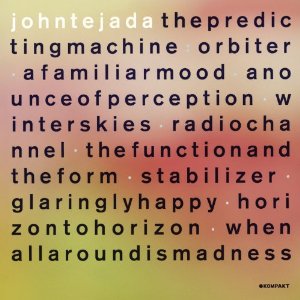Some people think they’re mere conduits for the music; some think they’re on their way out in this age of flatlining industry; some (‘sup, Quietus eds) don’t think they need to be included in the reviews… but we can still talk about record labels, can’t we? Dance labels, specifically, and how so many of them end up being pretty much a microgenre in themselves. The likes of Warp and Planet Mu, who started with a consistent aesthetic and later sprouted in all kinds of directions, are anomalies. Generally, if a dance imprint’s stuck it out for, say, fifty releases, you can talk about “that Pubic Wax sound” (or whatever the label’s called) and someone somewhere will understand you.
Kompakt Records of Cologne, who have released The Predicting Machine, the ninth solo album by John Tejada, definitely have a default “sound” in the minds of many. It probably took root around 2003, and the productions of Germans like Superpitcher, DJ Koze and Kompakt boss Michael Mayer: perfectionist constructs which tended to be lush and expansive, rather than dry and functional. Their relationship with minimal didn’t emulate the steely glare of Robert Hood and the like; there were elements of deep house, but unlikely to be confused with the dusty grooves of a Kerri Chandler. Thing is, there’s always been a lot more to the Kompakt roster than this. Like the gravity-free ambience of Gas and Andrew Thomas, or the microscopic detail of Thomas Fehlmann, or Matias Aguayo’s clever voices-turned-into-beats alchemy. Tejada, an LA-based clubland auteur, debuted on Kompakt last year with the Parabolas LP: subtle yet strident, and hinting at the influence of Nineties UK IDM, it slipped into the label’s discography like a nicely moisturized hand into a patent leather glove.
The Predicting Machine is a little bit more peaktime, a long way from aggro but with a whack of adrenaline in its sweat. If Kompakt hadn’t ended up taking this on, maybe Tejada would have had luck punting it to Modeselektor and their Monkeytown label. ‘Orbiter’, which launches the ten-track album, brings the kickdrum to the forefront, locks a synth riff in a wind tunnel and phases another one all over the shop. Although dude can’t be far off a hundred releases now, and has covered a decent amount of ground therein, this is the first time I’ve heard him and felt like he’s channeling LFO. The 2007-era mersh-house bassline and synthetic strings of ‘Stabilizer’ hint, you feel, at a more nakedly commercial side: it’s wickedly effective, this, but woe betide anyone who’ll get snobbishly cold feet if it turns up on an Annie Mac mix CD.
For the most part, matters are a little bit more… refined than these two cuts, but TPM still has a good half an hour of insistent ear-burrowing. It’s pretty front-loaded in that regard: following ‘Orbiter’, ‘A Familiar Mood’ consolidates the vibe through lurching tech-house and wistful chords, after which ‘An Ounce Of Perception’ builds and builds and swells at roughly the clip of that ‘schaffel techno’ gear that coexisted and intermingled with the aforementioned sound of 2003. And while it sits plumb in the middle of the album, ‘The Function And The Form’ is as springy as it gets: its melody could have graced a prime Orbital offering, the drum programming makes you suspect Tejada has lent an ear to what Hessle have been releasing this year.
Frequently lauded in the past for his casual eclecticism, he shifts between style and mood with a swinging ease elsewhere on this release. ‘Winter Skies’ coasts along on keyboard melodies of purest quartz, subtle and cyclical enough to have emerged from Roedelius’ venerable brain. The gap between this and the album’s previous sops to the dancefloor is bridged towards the end, in the form of ‘Glaringly Happy’ and ‘When All Around Is Madness’; ‘Radio Channel’ is more ambient still, wholly beatless in fact. When Tejada admitted to constructing The Predicting Machinewith Kompakt Records in mind, there’s every chance he was thinking about their roughly annual, often splendid Pop Ambient compilations as much as their sleek 130BPM autobahn cruisers.
To this end, it’s unlikely John Tejada is going to change the wider perception of Kompakt, such as it is. Neither is he going to change the current direction of electronic music, or most likely even find himself with an enduring banger like his 2004 single ‘Sweat (On The Walls)’. Half of it’s probably too subtle to stay on the stereo at a house party. Solitude and/or headphones are the key to The Predicting Machine, another unflashily fine opus from a fellow who’s almost cursed, in terms of the praise he gets, by being too reliable. Alternatively, there’s a new Michael Mayer album out in about six weeks, you could just wait for that. I wouldn’t, though.


